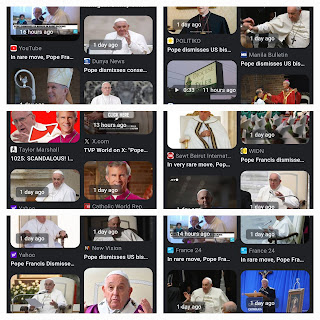when He says “I am the way and the truth and the life. No one comes to the Father except through me " But they seem to forget the rest of the Sacred Scriptures:
In the first letter to the Corinthians, Saint Paul rebukes them for sowing discord: "For it has been reported to me about you, my brothers, by Chloe's people, that there are rivalries among you. I mean that each of you is saying, “I belong to* Paul,” or “I belong to Apollos,” or “I belong to Cephas,” or “I belong to Christ.”
 In the Beatitudes, Jesus Warns about hate stated, or implied “You have heard that it was said to your ancestors,n ‘You shall not kill; and whoever kills will be liable to judgment. But I say to you, whoever is angry with his brother will be liable to judgment,o and whoever says to his brother, ‘Raqa,’ will be answerable to the Sanhedrin, and whoever says, ‘You fool,’ will be liable to fiery Gehenna. Therefore, if you bring your gift to the altar, and there recall that your brother has anything against you, leave your gift there at the altar, go first and be reconciled with your brother, and then come and offer your gift - Matthew Chapter 5
In the Beatitudes, Jesus Warns about hate stated, or implied “You have heard that it was said to your ancestors,n ‘You shall not kill; and whoever kills will be liable to judgment. But I say to you, whoever is angry with his brother will be liable to judgment,o and whoever says to his brother, ‘Raqa,’ will be answerable to the Sanhedrin, and whoever says, ‘You fool,’ will be liable to fiery Gehenna. Therefore, if you bring your gift to the altar, and there recall that your brother has anything against you, leave your gift there at the altar, go first and be reconciled with your brother, and then come and offer your gift - Matthew Chapter 5
A cursory look at the Catholic Catechism shows that while the Blessed Virgin Mary is addressed properly, as the Mother of God, she is not equal to Gid:
(
CCC 487) What the Catholic faith believes about Mary is based on what it believes about Christ, and what it teaches about Mary illumines in turn its faith in Christ
488 "God sent forth his Son", but to prepare a body for him, he wanted the free co-operation of a creature. For this, from all eternity God chose for the mother of his Son a daughter of Israel, a young Jewish woman of Nazareth in Galilee, "a virgin betrothed to a man whose name was Joseph, of the house of David; and the virgin's name was Mary":
The Father of mercies willed that the Incarnation should be preceded by assent on the part of the predestined mother, so that just as a woman had a share in the coming of death, so also should a woman contribute to the coming of life.
490 To become the mother of the Savior, Mary "was enriched by God with gifts appropriate to such a role." The angel Gabriel at the moment of the annunciation salutes her as "full of grace". In fact, in order for Mary to be able to give the free assent of her faith to the announcement of her vocation, it was necessary that she be wholly borne by God's grace.
491 Through the centuries the Church has become ever more aware that Mary, "full of grace" through God, was redeemed from the moment of her conception. That is what the dogma of the Immaculate Conception confesses, as Pope Pius IX proclaimed in 1854:
The most Blessed Virgin Mary was, from the first moment of her conception, by a singular grace and privilege of almighty God and by virtue of the merits of Jesus Christ, Savior of the human race, preserved immune from all stain of original sin.
960 The Church is a "communion of saints": this expression refers first to the "holy things" (sancta), above all the Eucharist, by which "the unity of believers, who form one body in Christ, is both represented and brought about" (LG 3).
963 Since the Virgin Mary's role in the mystery of Christ and the Spirit has been treated, it is fitting now to consider her place in the mystery of the Church. "The Virgin Mary . . . is acknowledged and honored as being truly the Mother of God and of the redeemer. . . . She is 'clearly the mother of the members of Christ' . . . since she has by her charity joined in bringing about the birth of believers in the Church, who are members of its head." "Mary, Mother of Christ, Mother of the Church."
964 Mary's role in the Church is inseparable from her union with Christ and flows directly from it. "This union of the mother with the Son in the work of salvation is made manifest from the time of Christ's virginal conception up to his death"; it is made manifest above all at the hour of his Passion:
Thus the Blessed Virgin advanced in her pilgrimage of faith, and faithfully persevered in her union with her Son unto the cross. There she stood, in keeping with the divine plan, enduring with her only begotten Son the intensity of his suffering, joining herself with his sacrifice in her mother's heart, and lovingly consenting to the immolation of this victim, born of her: to be given, by the same Christ Jesus dying on the cross, as a mother to his disciple, with these words: "Woman, behold your son.
965 After her Son's Ascension, Mary "aided the beginnings of the Church by her prayers." In her association with the apostles and several women, "we also see Mary by her prayers imploring the gift of the Spirit, who had already overshadowed her in the Annunciation."
966 "Finally the Immaculate Virgin, preserved free from all stain of original sin, when the course of her earthly life was finished, was taken up body and soul into heavenly glory, and exalted by the Lord as Queen over all things, so that she might be the more fully conformed to her Son, the Lord of lords and conqueror of sin and death." The Assumption of the Blessed Virgin is a singular participation in her Son's Resurrection and an anticipation of the resurrection of other Christians:
In giving birth you kept your virginity; in your Dormition you did not leave the world, O Mother of God, but were joined to the source of Life. You conceived the living God and, by your prayers, will deliver our souls from death
967 By her complete adherence to the Father's will, to his Son's redemptive work, and to every prompting of the Holy Spirit, the Virgin Mary is the Church's model of faith and charity. Thus she is a "preeminent and . . . wholly unique member of the Church"; indeed, she is the "exemplary realization" (typus) of the Church.
968 Her role in relation to the Church and to all humanity goes still further. "In a wholly singular way she cooperated by her obedience, faith, hope, and burning charity in the Savior's work of restoring supernatural life to souls. For this reason she is a mother to us in the order of grace."
969 "This motherhood of Mary in the order of grace continues uninterruptedly from the consent which she loyally gave at the Annunciation and which she sustained without wavering beneath the cross, until the eternal fulfillment of all the elect. Taken up to heaven she did not lay aside this saving office but by her manifold intercession continues to bring us the gifts of eternal salvation. . . . Therefore the Blessed Virgin is invoked in the Church under the titles of Advocate, Helper, Benefactress, and Mediatrix."
970 "Mary's function as mother of men in no way obscures or diminishes this unique mediation of Christ, but rather shows its power. But the Blessed Virgin's salutary influence on men . . . flows forth from the superabundance of the merits of Christ, rests on his mediation, depends entirely on it, and draws all its power from it." "No creature could ever be counted along with the Incarnate Word and Redeemer; but just as the priesthood of Christ is shared in various ways both by his ministers and the faithful, and as the one goodness of God is radiated in different ways among his creatures, so also the unique mediation of the Redeemer does not exclude but rather gives rise to a manifold cooperation which is but a sharing in this one source."
971 "All generations will call me blessed": "The Church's devotion to the Blessed Virgin is intrinsic to Christian worship." The Church rightly honors "the Blessed Virgin with special devotion. From the most ancient times the Blessed Virgin has been honored with the title of 'Mother of God,' to whose protection the faithful fly in all their dangers and needs. . . . This very special devotion . . . differs essentially from the adoration which is given to the incarnate Word and equally to the Father and the Holy Spirit, and greatly fosters this adoration." The liturgical feasts dedicated to the Mother of God and Marian prayer, such as the rosary, an "epitome of the whole Gospel," express this devotion to the Virgin Mary
972 After speaking of the Church, her origin, mission, and destiny, we can find no better way to conclude than by looking to Mary. In her we contemplate what the Church already is in her mystery on her own "pilgrimage of faith," and what she will be in the homeland at the end of her journey. There, "in the glory of the Most Holy and Undivided Trinity," "in the communion of all the saints," the Church is awaited by the one she venerates as Mother of her Lord and as her own mother.
In the meantime the Mother of Jesus, in the glory which she possesses in body and soul in heaven, is the image and beginning of the Church as it is to be perfected in the world to come. Likewise she shines forth on earth until the day of the Lord shall come, a sign of certain hope and comfort to the pilgrim People of God.
493 The Fathers of the Eastern tradition call the Mother of God "the All-Holy" (Panagia), and celebrate her as "free from any stain of sin, as though fashioned by the Holy Spirit and formed as a new creature". By the grace of God Mary remained free of every personal sin her whole life long























